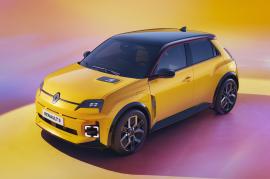Here’s why Tesla’s New Model Y is the best electric car I’ve driven
Best-seller updated with a drastically different design
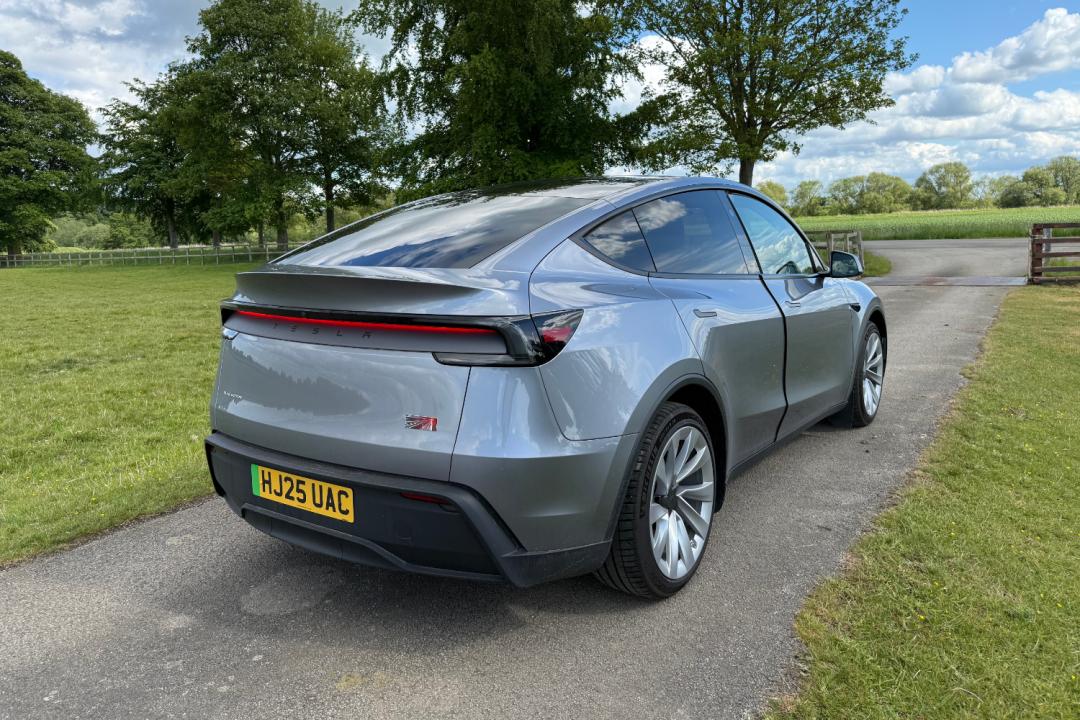
Stuff Verdict
Fast, smooth, spacious, smart, and refined. The 2025 Model Y is Tesla’s most complete car yet, and arrives at a price that will put electric SUV rivals on notice.
Pros
- Much-improved ride
- Ultra-modern styling a big step forward
- Spacious and practical
Cons
- Does everything really need to be controlled by a touchscreen?
- The one button you do get – hazard warning – is in a daft place
- Autopilot braking can be a bit eager
As a self-confessed Tesla fan, it’ll come as no surprise I was quite the fan of the refreshed Tesla Model 3 when I drove one last year. It wasn’t a huge overhaul, but was comfortable, quick, and finally fixed the foibles Tesla drivers largely just put up with. The new Model Y isn’t a repeat performance – it’s a radical rethinking of one of the world’s most popular electric SUVs.
The boated Model 3 look is gone, replaced with sleek lines, striking curves, and lights that wouldn’t look out of place on a concept car. It’s equal parts flashy and futuristic, which is precisely what you’d want from a car that silently rockets off the line like it’s escaping a black hole.
Entry-level models start from $44,990/£44,990, which is lower than the previous generation and puts it among more mainstream electric SUV competition. There are a lot more rivals in 2025 than there were when the Model Y first arrived, though, including plenty of more affordable alternatives. And none carry the baggage associated with the Tesla brand. Does the much-improved Model Y earn the attention of more than just the Tesla faithful?
- Related: buy or lease a Tesla Model Y here
How we test cars
Every electric car reviewed on Stuff is tested on a range of road surfaces and, where possible, in varying weather conditions. We use our years of experience to compare with rivals and assess ergonomics, technology features and general usability. Manufacturers have no visibility on reviews before they appear online, and we never accept payment to feature products.
Find out more about how we test and rate products.
The styling
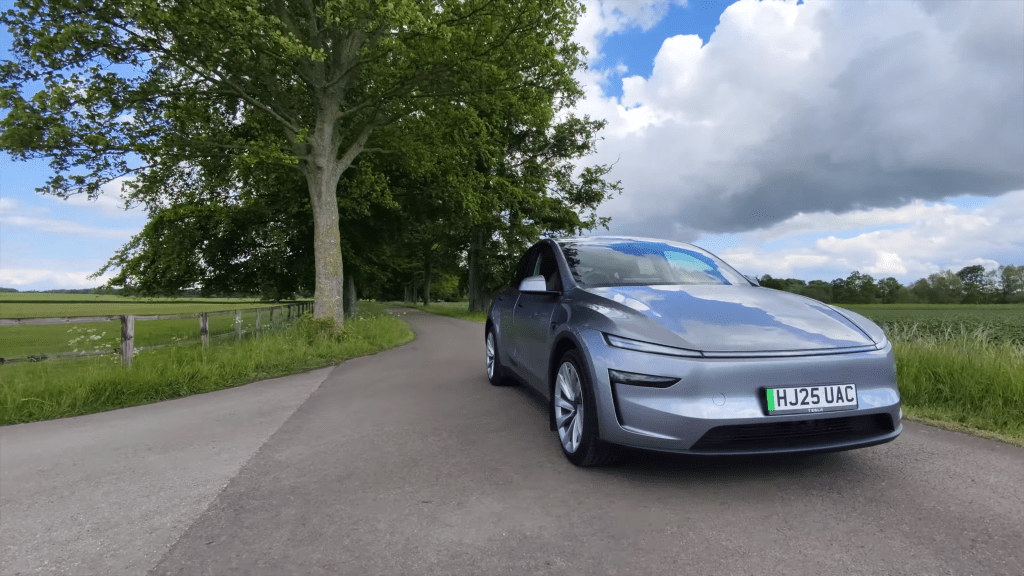
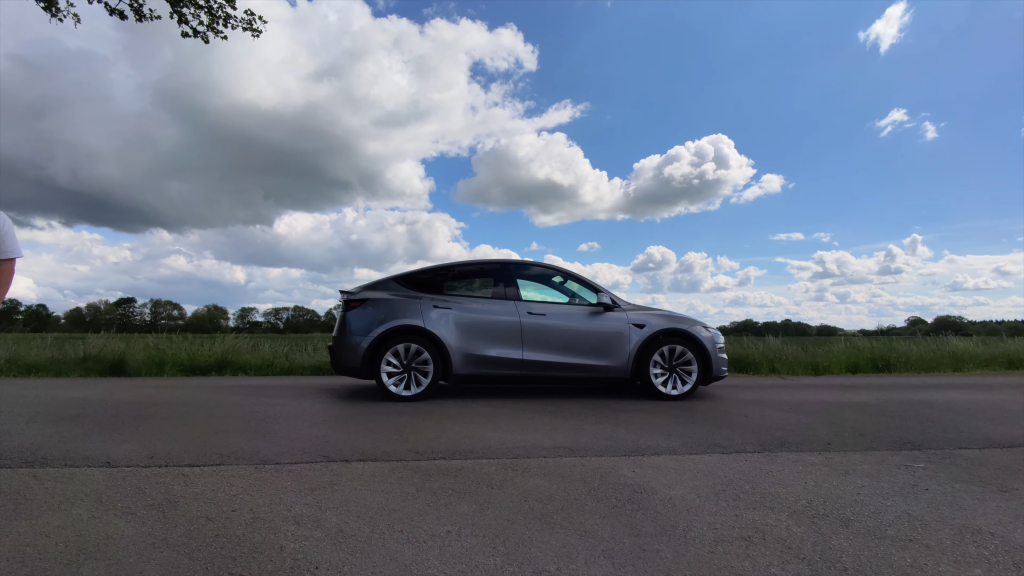
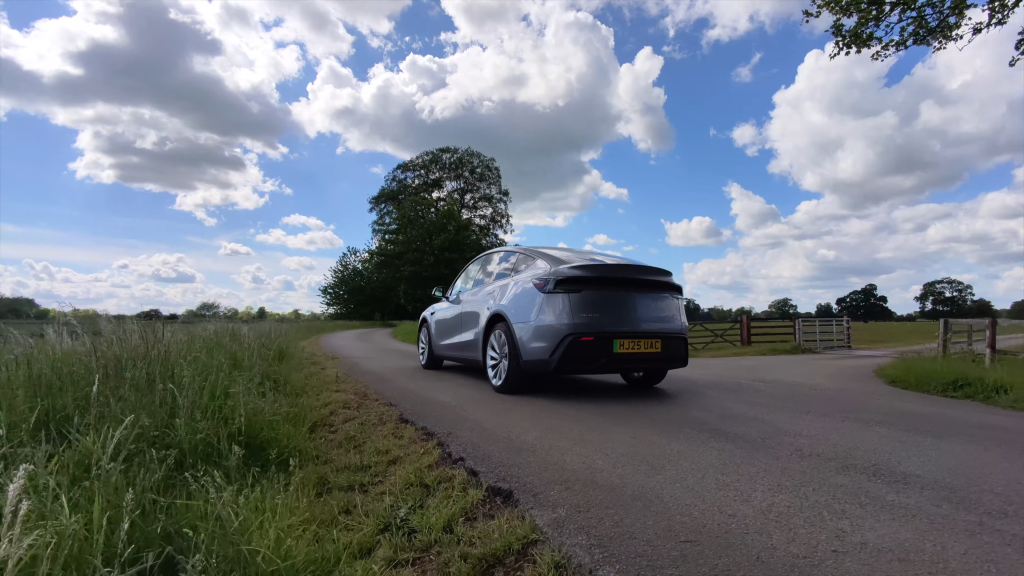
Gone is the stretched, jellybean silhouette of the old Y. In its place is a sculpted, athletic SUV that looks like it was designed by someone who finally got to use the curved lines tool in CAD. It looks ultra-modern, distilling the essence of Tesla’s most divisive vehicles – the Cybertruck and the Cybercab – into something far more palatable.
A new light bar dominates the car’s nose, stretching across the entire front end like a smirking face. The slim LED headlights that flank it on either side are bright without being obnoxious, with adaptive dimming that effectively prevents other drivers from being dazzled.
The bonnet is smoother, and crucially, the Tesla badge is gone. Some will say the design is so distinctive it doesn’t need branding; others might argue it’s Tesla acknowledging the logo has lost some lustre in recent years, due to the actions of its controversy-courting owner.

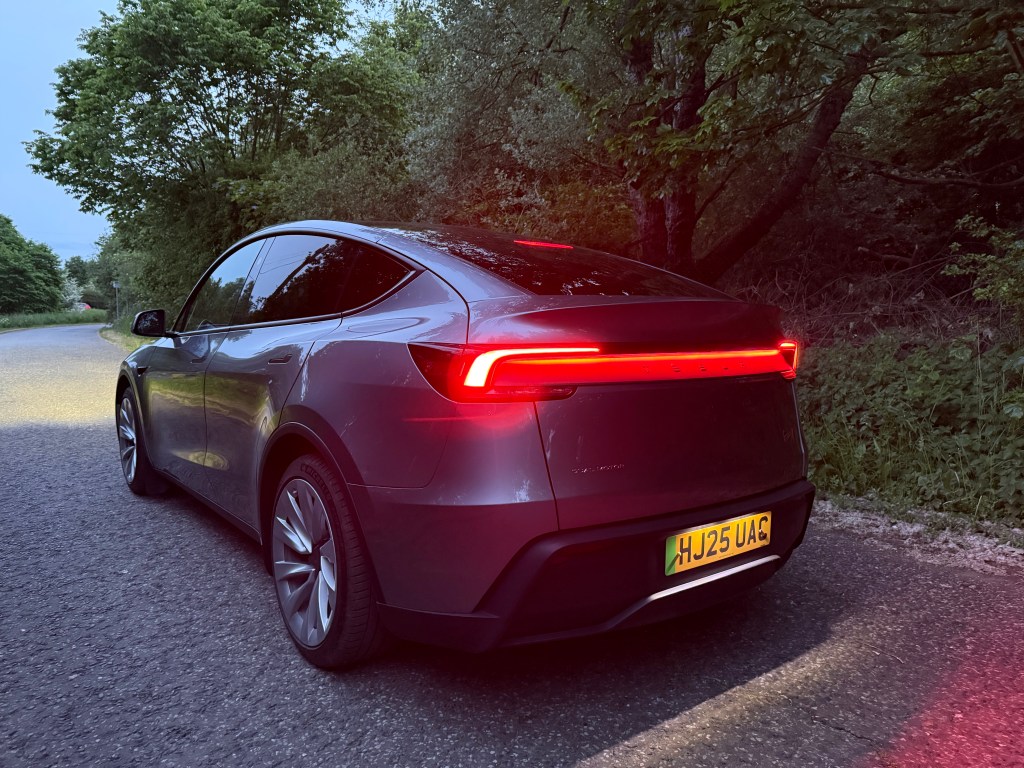
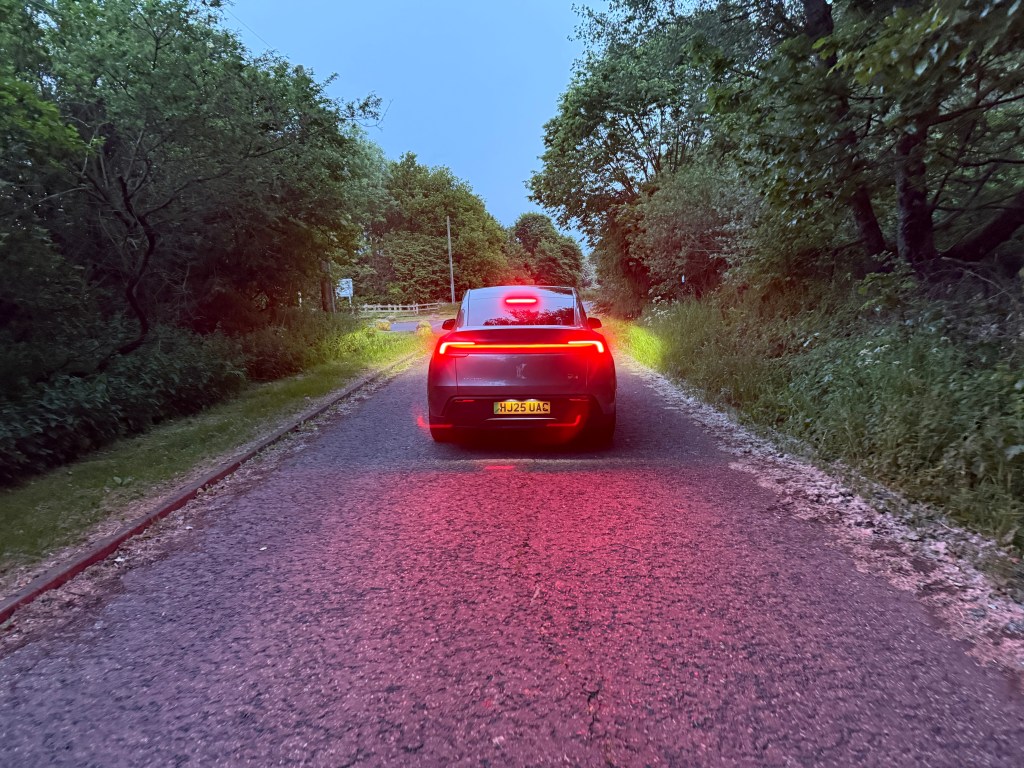
Things are even more interesting around the back. The tail lights cast a red glow that diffuses down onto the Tesla logo beneath the boot release – no actual light bar required. The effect is surprisingly elegant and minimalist, leaving a trail of red light in your wake unlike anything I’ve driven before. It’s effortlessly cool and quite a head-turner.
The Launch Edition I drove adds some bespoke badging, but all versions get a subtle rear spoiler.

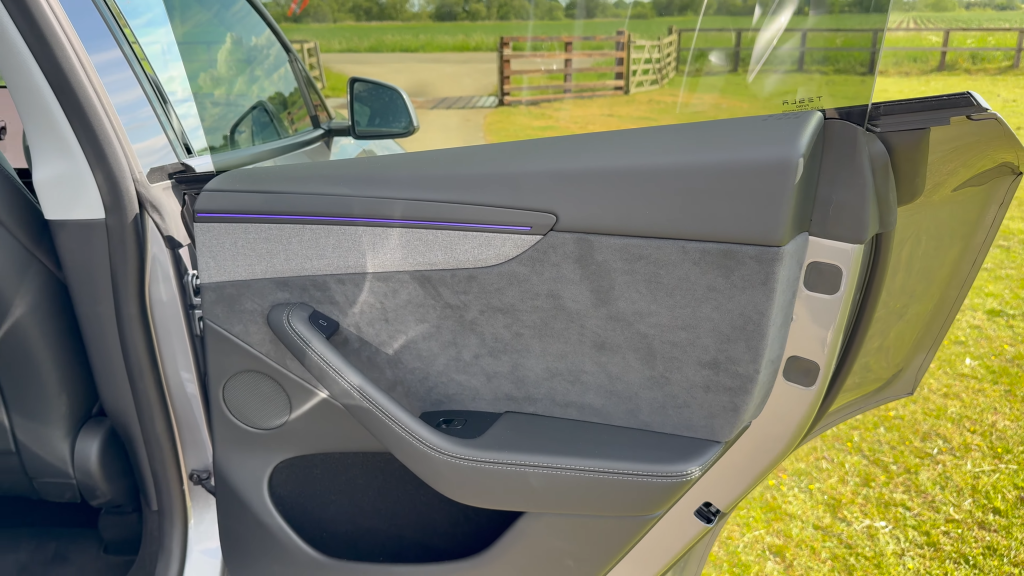
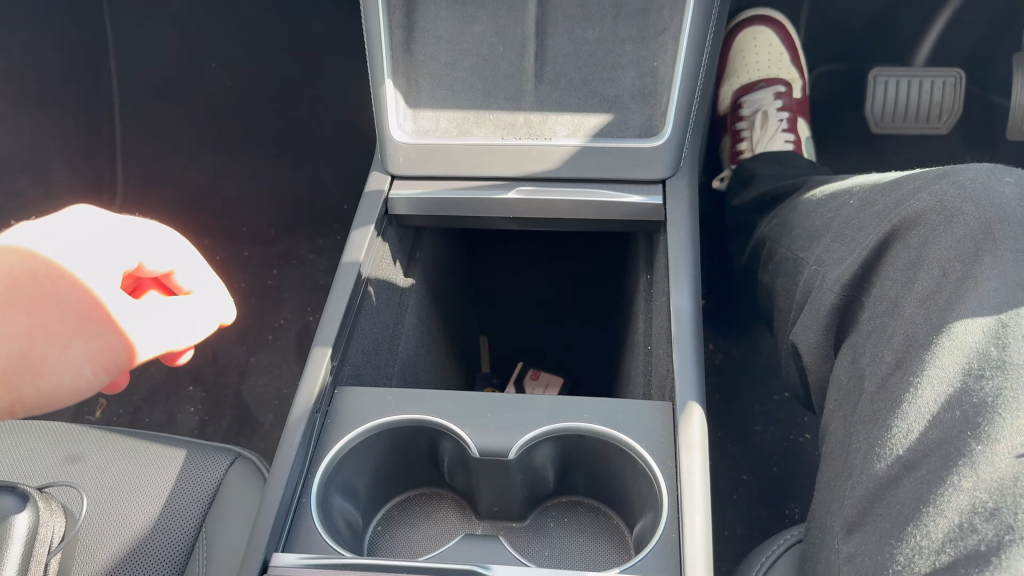
The futuristic theme continues inside the cabin, only this time with an added layer of plush. A new velvet-like trim on the dash and doors feels fancy, but should be easy enough to clean if a toddler smears it with yogurt. An ambient LED strip then wraps around the front and rear of the cabin for a spaceship-style glow – although frustratingly doesn’t do a complete loop. There’s a gap around halfway down the doors that’s small but maddening if you’re cursed with detail-oriented OCD like me.
Storage is generous throughout, and the magnetic sun visors are a small but very welcome upgrade. They light up with LEDs when flipped down, and snap into place with a satisfying click. You’ll probably never use them unless you’re reapplying makeup at the lights, but it’s the thought that counts.
Otherwise the ultra-minimalist interior remains, with a few smarter design choices scattered throughout. Dual wireless phone chargers live just below the screen now, so your passenger can keep their handset refuelled as well.
The drive


Tap the brake and the Model Y comes alive; no buttons to press or keys to turn, just a quiet whirr as it gets ready to go. The new automatic gear selection almost always gets it right, too. If you’ve got your seatbelt on and there’s a wall in front of you, it’ll pick reverse. That spares you the awkward fumbling with Tesla’s screen-based gear selector which, let’s be honest, no-one asked for.
Acceleration remains as brutal as before, with around 500bhp helping it hit 0-60mph in just 4.1 seconds. And this isn’t the Performance spec – that is coming later in the year. If leaving other drivers in the dust at traffic lights tickles your pickle, you’ll be right at home.
More importantly, it feels planted while doing so. The ride is smoother than the already excellent new Model 3, which is largely down to the newly revised suspension. It doesn’t wallow like many cushy SUVs do, staying controlled while also gliding over dodgy Tarmac. It’s a major improvement over the old Model Y.
Tesla has dialled in the one-pedal regenerative braking very well. There’s no jerking to a halt, no nervous passengers bracing themselves – just a gentle deceleration that makes the brake pedal almost redundant. Autopilot also returns, taking care of long motorway drives with smooth lane changes and chilled cruising. I did notice it being a bit heavy on the brakes this time around, though.
European safety laws forced a rename on my side of the Atlantic, with Autosteer not able to change lanes for you. The Enhanced Autopilot package, a $3500/£3500 extra, can. This also includes Navigation on Autopilot and traffic light detection, which lets the car suggest what to do while following directions. You’ve got to keep your hands on the wheel the entire time, unlike Bluecruise on the Ford Mustang Mach-E – but Tesla’s system can be used anywhere. Whether it’s worth paying extra for is still a bit of a headscratcher. It looks like Full Self-Driving might be coming in September, which will be much more compelling. So maybe cash in on Autopilot now in case prices go up.
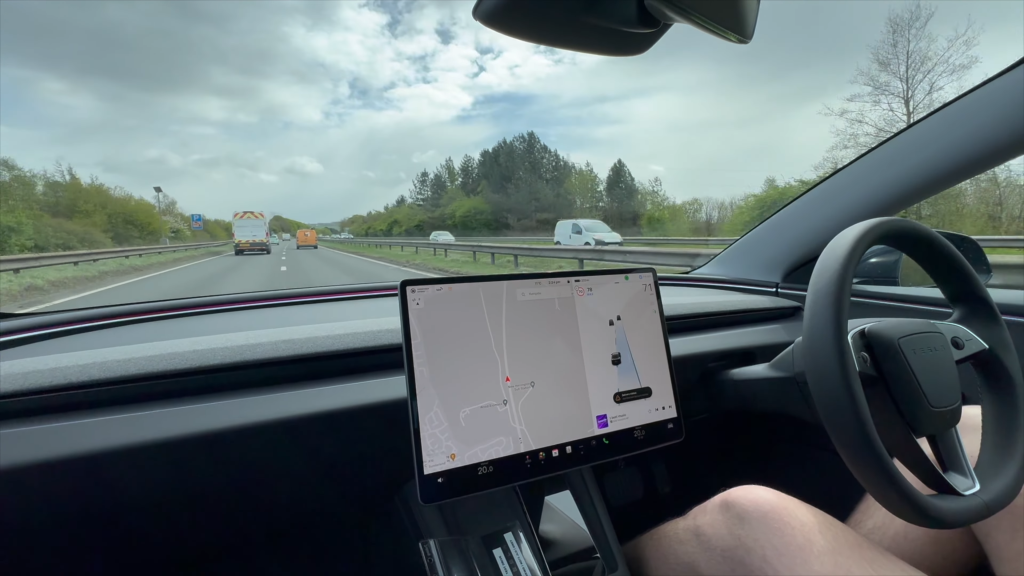
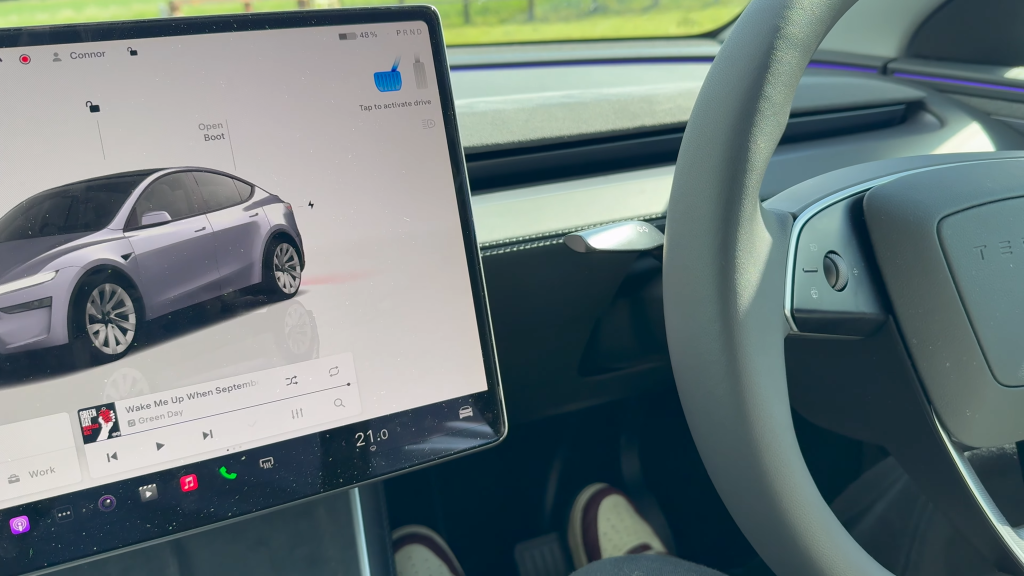
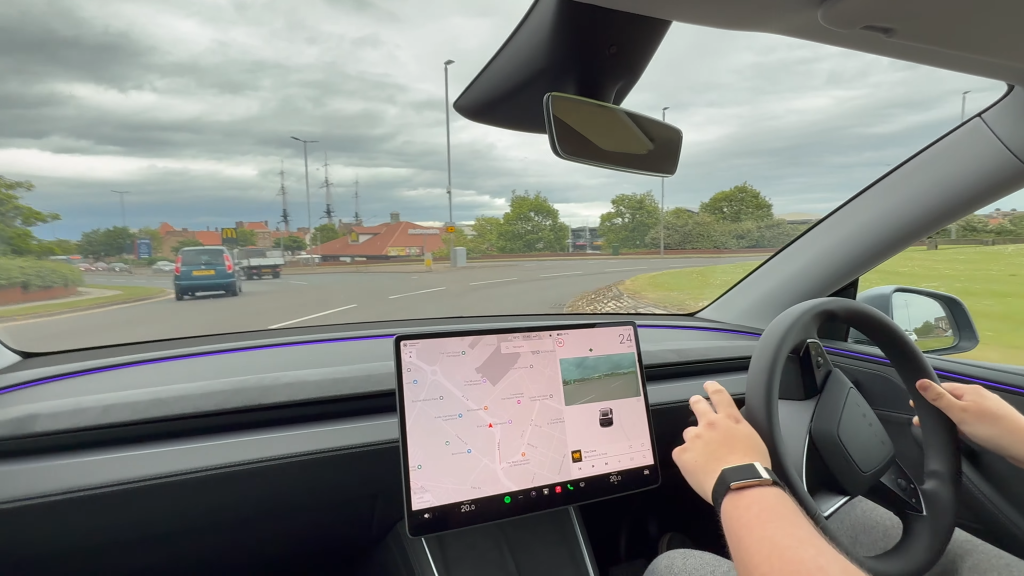
Tesla’s Supercharger network continues to make charging a breeze. The newest ones can go up to 250kW, so you can get to full in around 45 minutes. It’s the least inconvenient it can be on this car, although Superchargers are more spread apart in the UK than they are in the US.
The technology
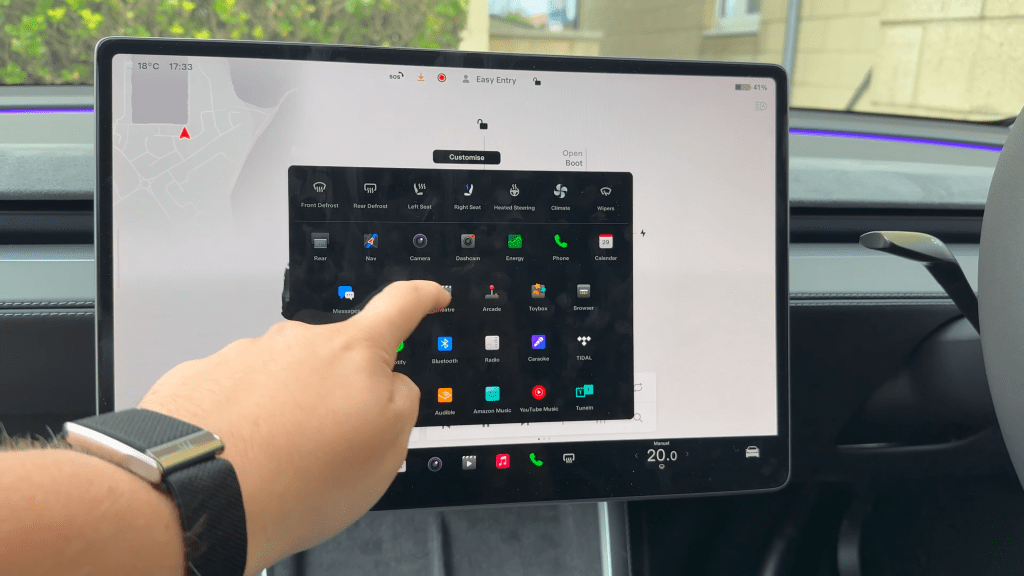
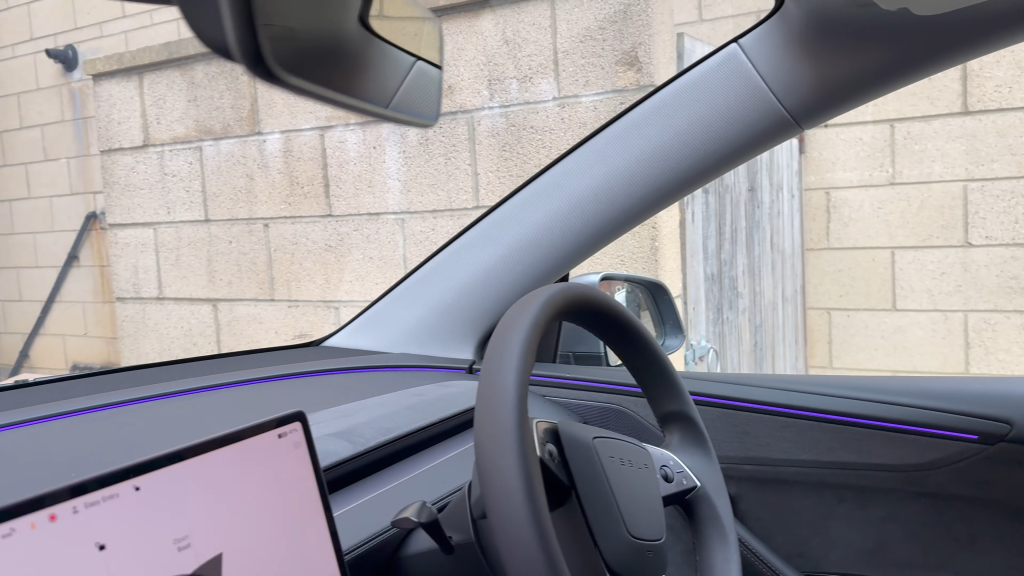
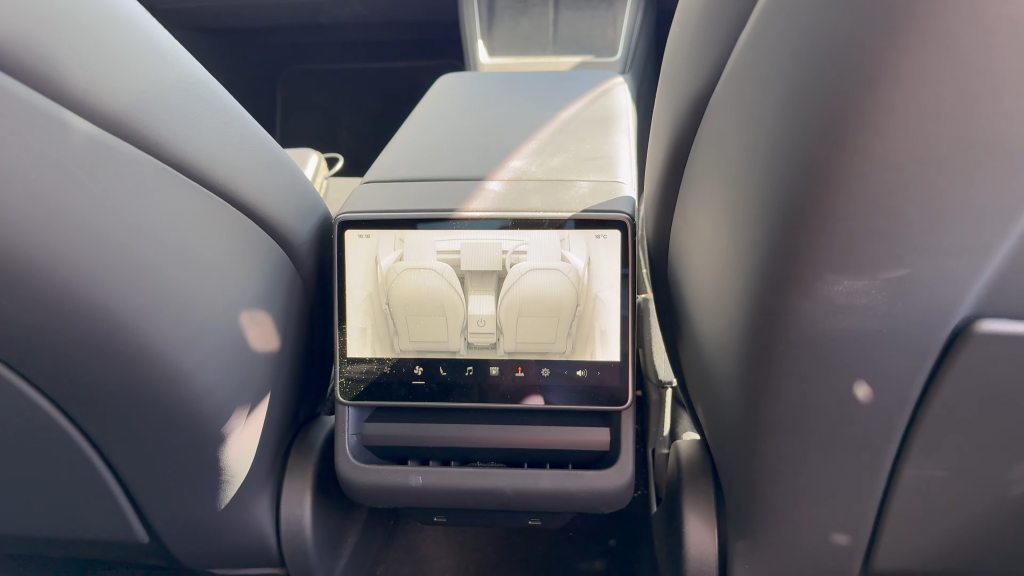
Tesla’s signature central landscape touchscreen once again acts as your command centre, with everything – and I mean everything – controlled from it. Want to heat or cool the rear seats? Screen. Fold down the back row for extra boot space? Screen. Watch Netflix while you charge? Yep, that too.
It’s overkill at times; I longed for a button to adjust the temperature, and having to tap an on-screen button just to open the glovebox feels like tech for the sake of it.
Spotify, Apple Music, and Tidal are all integrated into the infotainment, with the Long Range model getting 17 speakers to blast them through. Improved microphones have made calls clearer, helped by the air conditioning being dialled down automatically so it doesn’t blast over your voice. A secondary rear display gives rear passengers their own entertainment options, which is ideal for road trips with kids. They can play game, control their seats, or adjust music playback – and if the backseat chaos gets out of hand, you can override it all from the front screen.
Storage is better thought out this time around. The centre console offers deep storage under the armrest, and there’s a satisfying mechanism to cover your cup holders and front cubby for a cleaner look. And the boot? Absolutely massive. At 854 litres, you’ll struggle to fill it, and with the seats down, you get over 2100 litres. They’re power-controlled now, which should make trips to the dump that bit easier; the front seats get moved forward to accommodate the rear ones as they fold, then moved back ready for driving – but only when they aren’t occupied. Very clever.
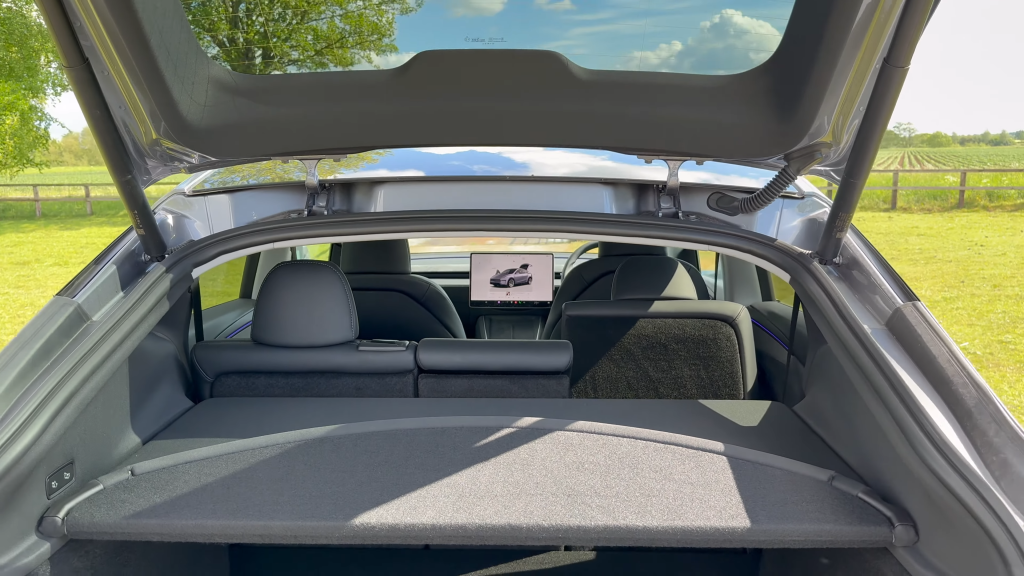
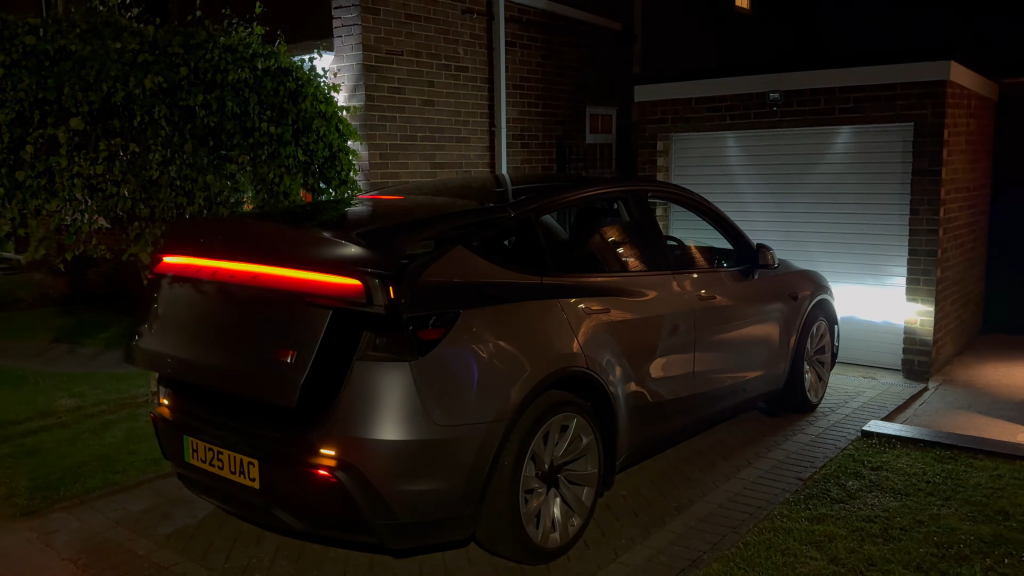
A new front-facing camera – finally – makes tight spots less panic-inducing. A built-in washer saves you having to get out of the car to wipe it on wet days.
The Model Y can still do Tesla’s familiar light show party trick. The new light bars mean it’s less like a children’s birthday party and more like a high-end Vegas lounge act. You can control everything from the companion app, and even use your smartphone as the key (while still in your pocket). These days, you can even open the boot by standing behind the car with your phone in your pocket. It’s really rather clever stuff.
Tesla New Model Y verdict
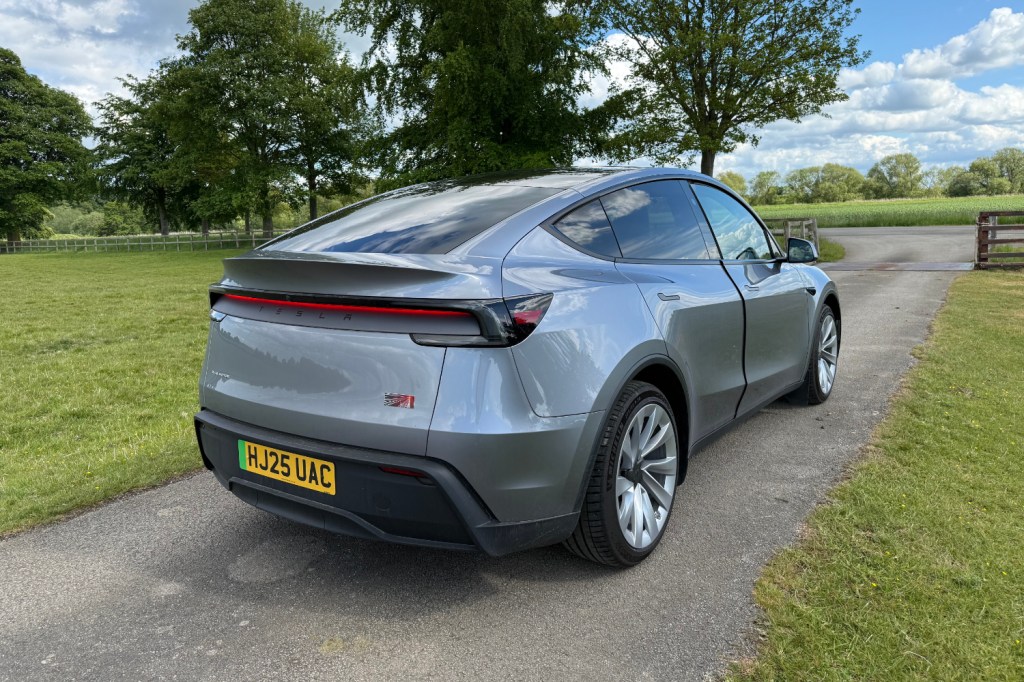
The new Model Y isn’t just a facelift – it’s a full transformation. Tesla’s styling is bold and confident, the interior is smarter and feels more lavish, and the right quality has majorly improved.
While there are a few small irritations – that awkwardly placed hazard light button, for instance – they’re hardly deal-breakers. You’ll forget about them the moment you tap the accelerator or marvel at how much stuff you can cram into the boot.
It’s by no means a bargain buy, but considering what else is out there in the $45,000 ballpark, other electric SUV makers should be rather worried indeed.
Stuff Says…
Fast, smooth, spacious, smart, and refined. The 2025 Model Y is Tesla’s most complete car yet, and arrives at a price that will put electric SUV rivals on notice.
Pros
Ride has improved greatly from the last Model Y
Ultra-modern styling is a big step forward
Spacious and practical
Cons
Does everything really need to be controlled by a touchscreen?
The one button you do get – hazard warning – is in a daft place
Autopilot braking can be a bit eager
Tesla New Model Y specifications
| Powertrain | 2x permanent magnet synchronous motors |
| Battery | 75kWh |
| Power | 514bhp |
| Torque | 487 lb-ft (approx) |
| 0-60mph | 4.1 seconds |
| Top speed | 125 mph |
| Range | 353 miles |
| Charge rate | Up to 250 kW |
| Cargo volume | 854 litres |
